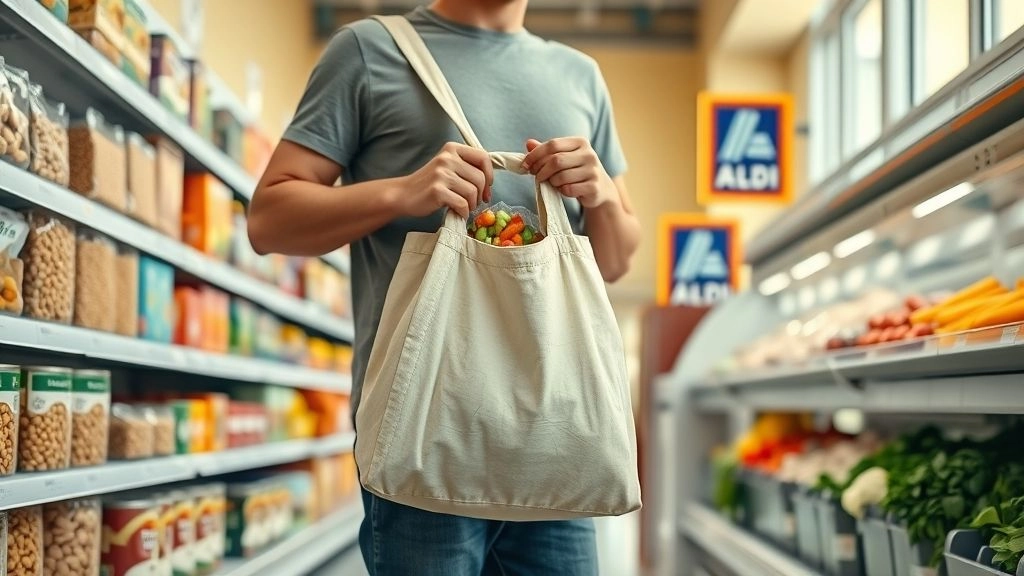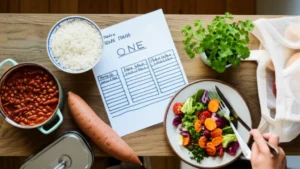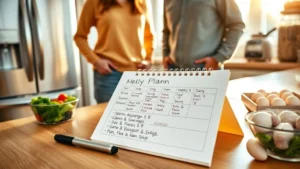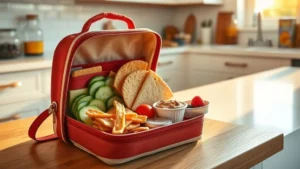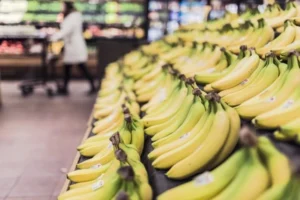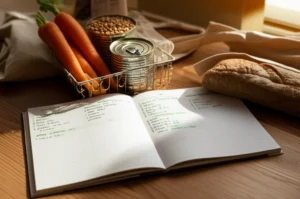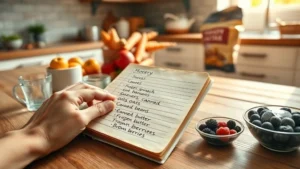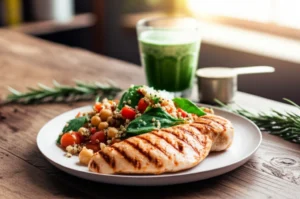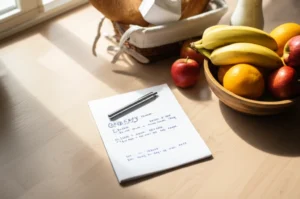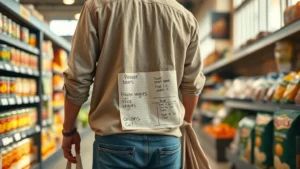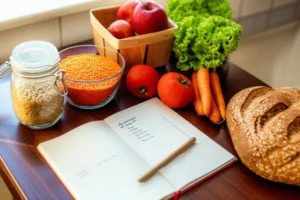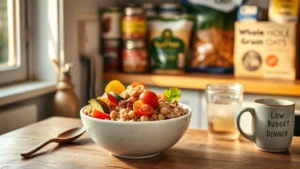So, you’ve been staring at your fridge, half-full of groceries you never touched, wondering where all your money went. That’s the thing about flying solo—it’s easy to buy too much, waste food, and burn through your budget without even meaning to. If this sounds familiar, you’re not alone, and honestly, it’s nothing to beat yourself up over. I’ve been there too, drowning in wilted veggies and mystery leftovers I kinda forgot about.
But what if I told you that learning how to grocery shop on a budget for 1 isn’t rocket science? Or that it can actually feel freeing once you crack the code? Yup, that’s right. It’s about small, intentional steps that save your sanity and cash without turning your life upside down.
Why It’s Tricky
Ever Notice Food Disappears Fast?
Shopping for one is weird. Most of the grocery world seems built for families or roommates. You buy a pack of chicken breasts, and half end up leftover in the fridge, staring at you accusingly. Or you grab a bunch of fresh herbs only to let half go bad because you forgot what they were.
I once read a Reddit post from someone who felt totally overwhelmed by meal planning and grocery shopping alone. The takeaway? It’s less about the grocery store being the enemy and more about how we approach it. (I think we’ve all fallen victim to the “I might use this” impulse… and then, nope.)
The Real Cost of “Just Grabbing Stuff”
Here’s a truth bomb: impulse purchases and poor planning don’t just hurt your wallet—they make your kitchen a fridge of regrets. You might spend $10 on snacks that never get eaten, or $8 on veggies that wilt before you touch them, and that quickly adds up. The trick is to be real about what you actually eat, not what Pinterest recipes make you think you should be eating three times a day.
Simple Game Plan
Map Out Your Meals, Kind Of
Okay, meal planning sounds like a big deal, but it doesn’t have to be this spreadsheet nightmare. Start small—pick a few meals you know you love or can whip up easily. You could plan for breakfast and dinner Monday through Thursday, and keep Fridays flexible (because who wants to cook every night?). This keeps the list short and shopping manageable.
Here’s a little secret: I plan recipes for two portions, so I’ve got lunch or dinner leftovers ready-made. And sometimes, I freeze half if I won’t eat it soon enough. That way, nothing goes to waste, but I still feel like I’m not eating the same thing forever.
Sample Weekly Sketch
| Day | Breakfast | Lunch | Dinner | Snacks |
|---|---|---|---|---|
| Mon | Oatmeal + fruit | Leftover stir-fry | Grilled chicken + salad | Apple slices |
| Tue | Yogurt + granola | Chicken wrap | Pasta + tomato sauce | Carrot sticks |
| Wed | Scrambled eggs | Leftover pasta | Veggie stir-fry | Mixed nuts |
| Thu | Smoothie | Salad + tuna | Soup + bread | Banana |
| Fri | Toast + peanut butter | Sandwich | Treat yourself dinner | Popcorn |
Pick Your Stores Wisely
Look, I get it—some grocery stores feel like a whole event, expensive and overwhelming. But for budget shopping? It pays to know your local gems. Discount grocers like Aldi or Walmart can save you a chunk of change without sacrificing quality. (Yep, that off-brand peanut butter? Tastes the same as the fancy one.)
Store Savings Snapshot
| Store | Average Savings on Basics | Pro Tip |
|---|---|---|
| Aldi | 20-30% | Download their weekly ad app for deals |
| Walmart | 15-25% | Check online rollback prices before you go |
| Local Farmers Market | Varies | Shop near closing for discounts |
Building Your Budget List
Can You Feed Yourself for $50?
Here’s a challenge (and yes, it’s possible): can you build a solid grocery list for under fifty bucks? Many have, and the trick is simple—focus on versatile staples and be picky with fresh produce. If you want ideas, check out this $50 grocery list for 1 person that helped me stretch each dollar without feeling like I was starving or eating cardboard.
18 Staples to Start With
Think:
- Eggs
- Dry pasta or rice
- Canned beans
- Frozen veggies (less waste!)
- Fresh fruit (pick 2 types max)
- Chicken (single breasts or thighs)
- Yogurt or milk
- Cooking oil and seasonings (your flavor bombs)
And yes, you can find a pretty clear idea in this Basic grocery shopping list. Having this kind of list stops you from wandering aisles thinking, “Eh, maybe I’ll need this someday,” and helps you stick to what really moves your meals forward.
The 6-to-1 Shopping Method
You may have heard about the viral TikTok grocery hack called the “6 to 1” method—six veggies, five fruits, four proteins, three starches, two sauces or spreads, and one fun item. It’s a genius way to simplify buying and reduce waste. If you’re flying solo, try a mini version—maybe 3 veggies, 2 proteins—to keep your haul manageable.
Someone shared how this method cut their grocery bill in half and made shopping feel straightforward instead of scary. I gave it a shot, and I was surprised how creative I got in the kitchen—with fewer ingredients, no less.
Shop Smart, Waste Less
Break It Up—Smaller, More Frequent Shops
Instead of one massive haul that fills your fridge until you forget what’s inside, try splitting your grocery trips into manageable chunks. The “3 in 1” grocery method is a neat trick where you do one bigger shop, then fill in with smaller trips later in the week. I’ve read from folks trying this that it’s a lifesaver for preventing waste without much extra effort. (If you’re like me and forget leftovers exist until they’re science experiments, this helps a ton.)
Use What You Buy—Repurpose and Freeze
Half a bunch of parsley? Don’t let it go limp. Freeze it. Celery sticking around after soup night? Freeze that too, or save the scraps for stock. The Washington Post had some ace tips on being honest about what you actually eat and planning accordingly to avoid tossing freshly bought perishables.
Try repurposing ingredients within their lifespan. For example, if you buy a bag of baby spinach for a salad, toss some in your smoothie the next day so nothing goes unused. Here’s a little secret: I store a stash of single chicken breasts in the freezer so I can grab only what I need and avoid wasting the rest.
Freezer Life Hacks
| Item | Freezer Life | Quick Thaw Idea |
|---|---|---|
| Chicken breasts | 3 months | Microwave gently or overnight fridge thaw |
| Herbs (parsley, cilantro) | 6 months | Freeze chopped in ice cube trays with olive oil |
| Vegetables (broccoli, spinach) | 8-12 months | Blanch then freeze; great for stir-fries/soups |
Flavor Doesn’t Have to Break the Bank
From personal experience and Food52’s tips, a few little flavor bombs make a huge difference. Things like soy sauce, hot sauce, and a good quality olive oil can lift simple dishes without needing an arsenal of spices that sometimes go untouched. These are usually sold in small containers, so grab what you love—as long as it gets used, you’re good!
For a smart list of pantry essentials that won’t empty your wallet, peek at this Essential grocery list on a budget. It saved me from buying those “just in case” spices that turn into dust collectors.
Putting It All Together
So, what’s the secret sauce to mastering how to grocery shop on a budget for 1? It’s about small plans, smart shopping, and being kind to your future self. Meal planning doesn’t mean you have to schedule every bite, but giving yourself a broad outline helps you stop the “oh, I’ll just grab something” impulse. Shopping with a list built around your real needs stops you from loading up on the whimsical stuff that never gets eaten.
The 6-to-1 method offers a framework to keep variety without chaos, while the “3 in 1” approach helps keep produce fresh and your budget intact. Don’t forget the magic of freezing and repurposing—these simple habits seriously cut food waste and keep more money in your pocket.
Feeling overwhelmed? Try starting with a Basic grocery shopping list or dipping your toes into a $50 grocery list for 1 person—these can be your launchpads to confident, budget-friendly solo shopping.
At the end of the day, you’ve got this. Grocery shopping alone on a budget isn’t a punishment—it’s a chance to take control of your food, your wallet, and even your week. So next time you head to the store, bring your plan, pack your patience, and treat yourself kindly. The payoff? More money saved, less stress, and meals you actually look forward to eating.
Ready to start? Grab that list and head out—you’ll thank yourself later.

